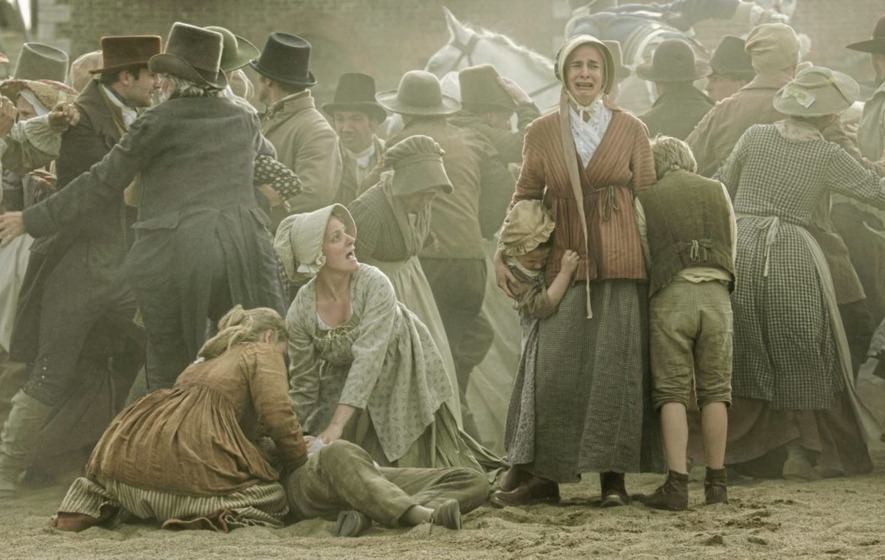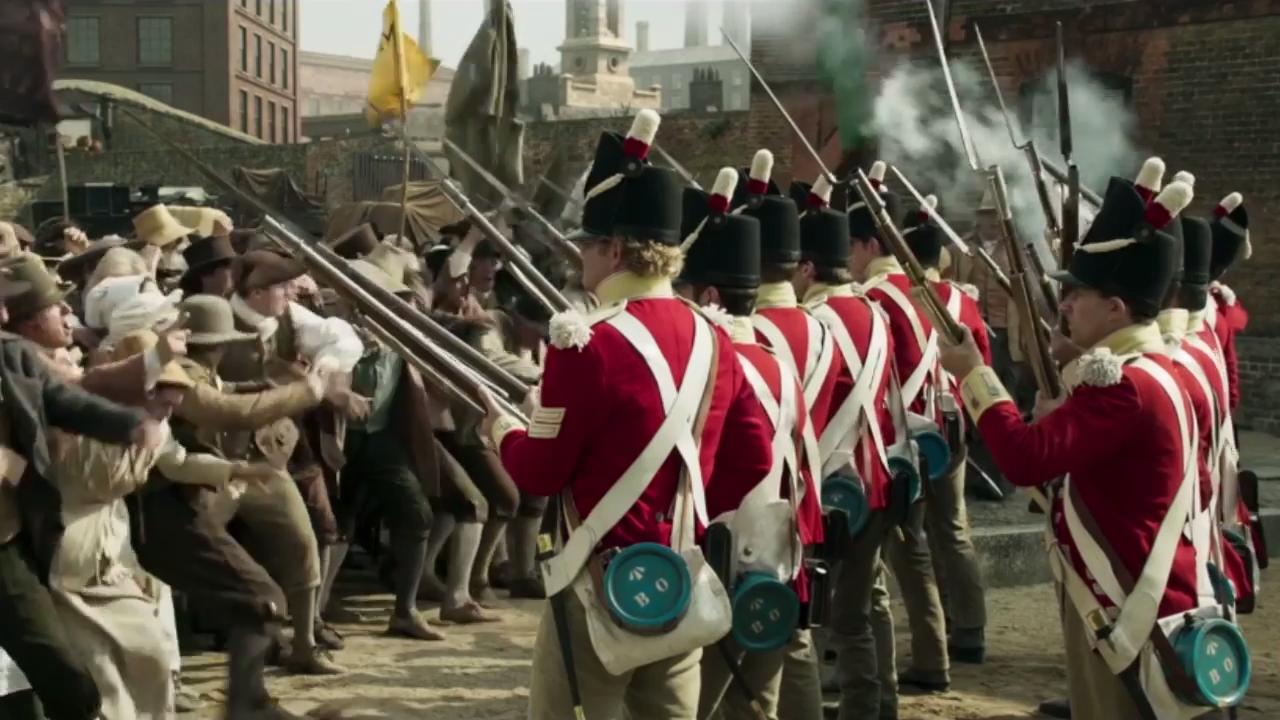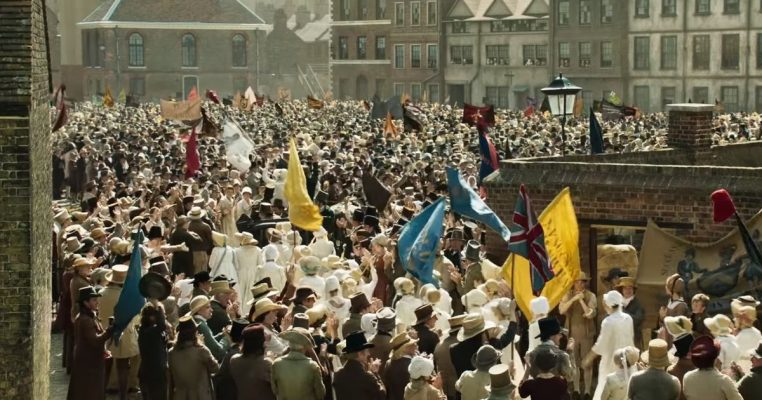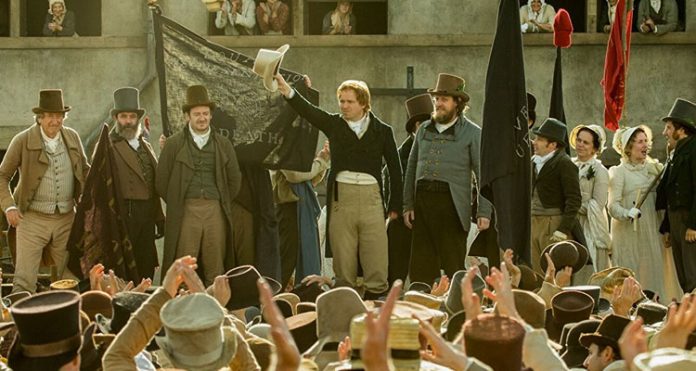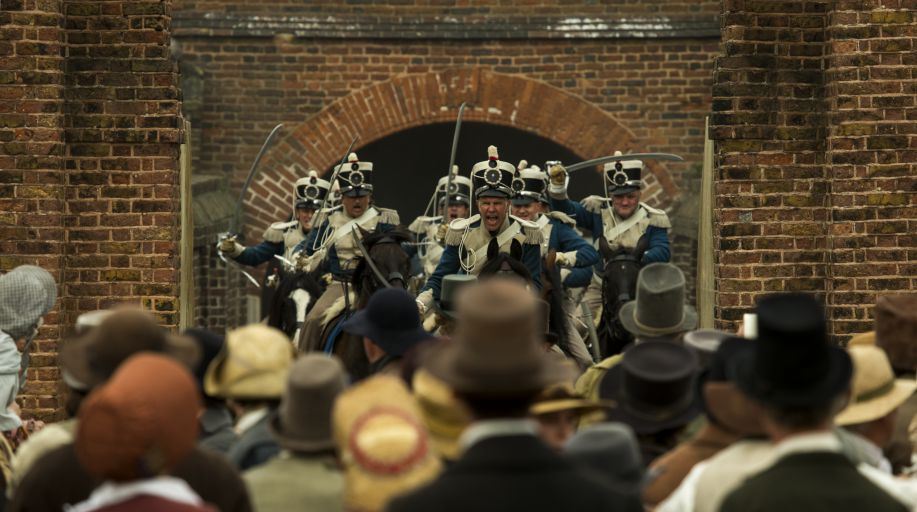In coordination with the release of his newest film, Peterloo, this month The Pink Smoke will be exploring the work of noted curmudgeon and dyspeptic genius Mike Leigh. From his early teleplays to his recent historical dramas, Leigh's focus has stayed constant: the elusive qualities of happiness, the constrictions of family, the friction between the have's and have-not's, the relationship between work and personal fulfillment.
Leigh unusual method for developing his screenplays (and his unique process for working with actors) results in films that are notably chaotic, complex, and spilling over with a sense of life that few artworks can match. We're excited to explore the worlds that Leigh has created; his films provide a seemingly inexhaustible supply of new discoveries, strange notions, startling emotions, and (most importantly) unforgettable characters.
{PiNK SMOKE PODCAST: PETERLOO}
{THEiR EARLiER STUFF WAS BETTER}
{SPALL OR NOTHiNG: PART 1}
{SECOND CHANCES: CAREER GiRLS}
{MiKE ON A BiKE}
~ by christopher funderburg ~
“I liked their earlier stuff better.” It’s a complaint you hear all the time with music, it’s a cliché even - fans who wished CCS had stayed art punks or don’t want to listen to Os Mutantes dabble in prog rock. For whatever reason, you don’t hear the complaint that much when it comes to film - when a director hops genres it doesn’t inspire the same feelings of frustration in their audiences as it does when a band adds synths or decides that now is the future of folk-core.
Maybe it’s because the boundaries aren’t as unforgiving in film - all you need to hear is that Dee-Dee Ramone recored a “rap” album to yell “Oh shit, Dee-Dee, don’t do it, you idiot!” Not that “Wes Craven directed a film about an inspirational music teacher” caused audiences to nod thoughtfully in support, but extreme examples like going from Freddy to Fiddlefest aside there’s less of a tendency for filmmakers than musicians to be accused of rejecting their fundamental artistic identity just because they tried something no one saw coming.
With music, image (and the image we hold of an artist in our minds) matters almost as much as the art itself - the album covers, the live performances, the attitude; it’s part of the artwork. Shit, kids smashed their Metallica CDs just because they cut their hair and those guys didn’t even make a true commitment to sucking until at least a couple albums later. But image being less important to The Idea of George Romero doesn’t fully explain why fans weren’t apt to begrudge him for wanting to make a movie about motorcycle-riding Ren Faire cosplayers.
I picked horror directors, Craven and Romero, as examples because the horror genre at least has defined boundaries. You can tell what’s a horror movie the way you can tell what’s a reggae song, but this is what I mean about boundaries: you can call Lars Von Trier’s Dancer in the Dark a musical all you want, but no one is going to confuse it with An American in Paris. Von Trier is somehow able to retain his fundamental artistic identity even when putting on the trappings of a genre with which he isn’t associated.
It goes without saying that there are genre-pushing, boundary-blurring musical artists. Tired-looking gentlemen with nice scarves and stubbly beards whose specialty is mixing up, I don't know, break-beat with psychedelia or what have you. I’m not here to talk to you about music - I’m trying to explain that the genre of filmmaking to which Lars Von Trier's work belongs isn't “dramas” or “art films” and definitely not “musicals” but “Lars Von Trier films.” Putting the horror genre aside, that’s the case for most great filmmakers: a Richard Linklater film is first and foremost an Richard Linklater film; a Seijun Suzuki film is first and foremost a Seijun Suzuki film. Who cares what genre they want to try out?
What I’ve outlined is also, you know, the basis for the auteur theory - the guiding principle of film criticism that sees True Artists bringing their personality to whatever genre they’re called on to try their hand at. Sam Fuller is going to do what Sam Fuller does, whether he’s doing it in a Western, a film noir, a spy film or one about Paul Winfield deprogramming a racist dog.
And to the point: Mike Leigh’s films belong only to the genre of “Mike Leigh films.” Not kitchen sink melodramas. Not historical dramas. Not working-class comedies. Not any of the pre-existing terms that are both accurate and pointless. Topsy-Turvy, his sprawling comedy about Gilbert and Sullivan creating The Mikado, initially seemed like an outlier in Leigh’s career but it proved that Leigh’s work didn’t need to be connected to drab London apartments and the misery of the modern workday for it to be quintessential.
When Leigh returned to similar territory with his portrait of 19th century marine-scape artist J.M.W. Turner, I don’t think anyone in their right mind assumed that meant he’d be required to give up on doing what he does as an artist. We saw with Topsy-Turvy that we didn’t need to worry about him losing himself just because he hopped genres and settings and centuries. “It goes together like Light Opera and Mike Leigh” isn’t something anyone in their right mind would’ve said before Topsy-Turvy but it sure as as shit ended up making sense. Before Topsy-Turvy existed, you couldn’t have predicted that Leigh would take the subject and then go ahead to devise and direct his usual kind of brilliant, unclassifiable thing.
But Peterloo is not his usual kind of brilliant, unclassifiable thing. It’s the factual story of a massacre that occurred during a political rally in Manchester in 1819 when the violent local Yeomanry decided to break up the massive crowd. It reminded me of The Wind that Shakes the Barley or The Charge of the Light Brigade - a tasteful, well-put together, sprawling historical drama. Whatever genre it belongs to, it doesn’t belong to the genre of “Mike Leigh films.” Not quite. Maybe not at all.
When I settled in to see it last fall at the Toronto International Film Festival, I assumed I was sitting down for the best films of the year. Since Meantime in 1983, nearly every Leigh film had been. There wasn’t any reason to guess that Mike Leigh would suddenly decide to stop being himself and put out a film that I would find deeply unsatisfying for the ways in which it doesn’t resemble Leigh’s other work.
It’s tempting to say that any talented but generally personality-deficient filmmaker like Peter Glenville or Ken Loach could have made Peterloo but I’m not sure if that's the truth or a cruelty. But Peterloo has me thinking about what it means for an artist to move away from themselves and what, as someone who loves their work, anyone owes them. I mean this as an open-ended idea - I don’t have an answer. What does it mean when Mike Leigh makes something that doesn't fully belong the "Mike Leigh" genre?
I certainly don’t want to be some clown trying to tell everybody that Jean-Luc Godard’s Goodbye to Language is “revolutionary” and rush to defend its embarrassing moving-painting sequences by saying they “leap off the screen” just because I loved Band of Outsiders when I was 16. The flipside to music fans giving up on bands when they wander out of their corner of the garden is the cinephile tendency to try to tell me O.C. and Stiggs is up to anything interesting. No matter how much you love The Man Who Shot Liberty Valance, you should understand that The Prisoner of Shark Island deserves contempt.1
But don’t I owe Mike Leigh something, don’t I owe him some measure of artistic freedom? Shouldn’t I be excited for him to step outside of himself? Shouldn’t I being willing to follow him where he wants to go, at least for now, even if it’s someplace I never imagined him headed? Does it matter that he ended up somewhere that I struggle to connect to his artistic identity?
I spent much of Peterloo peering into it, trying to see Mike Leigh somewhere inside of it through the fog. The experience left me wondering what I even meant when I told myself it didn’t seem like a Mike Leigh movie at all. What makes Peterloo not a Mike Leigh film? While it’s fun to imagine all the withering responses the notoriously grumpy Manchesterite would have to all these questions, I think most audiences who see the film will agree that it just doesn’t feel like the work of the filmmaker whose personality can be felt so forcefully in Bleak Moments, Life is Sweet and Vera Drake.
The typical Mike Leigh film for years carried a title card that read “devised and directed by Mike Leigh.” It was a nod to his proprietary creative process and its unusual results. The typical Mike Leigh film is an ensemble, a series of seemingly unconnected narrative threads following precisely developed characters through their day-to-day lives. The typical Mike Leigh film can feel like it's headed nowhere until a kind of clarity sharply emerges from the chaos.
There’s no doubt when you’ve seen the moment in a Mike Leigh film that gives it its meaning: Scott exploding at Poppy during her final driving lesson, Wendy unexpectedly addressing her daughter Nicola’s unhappiness in a conversation in the living room, Johnny and Louise singing about going back to Manchester. But to predict that moment, to foresee what might happen to draw meaning from the turmoil, is impossible to guess.
Peterloo dutifully, uncreatively even, organizes its pieces in place building towards a moment that you know is coming because it’s the title of the film. Being generous, I’d say it does its best to make characters out of people who are getting screen-time purely as a way of explaining the political situation. Scenes are written and organized around the explication of a massacre that happened because certain political actors were set into conflict with each other - in Leigh's defense, it's hard to imagine another way to approach it. Approaching it another way would've required imagination... the kind of artistic imagination Leigh has always had in spades. But Peterloo is a regular story, a story told in a regular way, which makes his devising and directing feel beside the point. It’s a sprawling, meandering ensemble but one in tedious contrast to the sprawling, meandering ensembles for which Leigh is known.
Instead of characters existing in their own stories, they feel like factions being carefully positioned in a narrative constellation - worse yet, they feel like they are being divided up into “good guys” and “bad guys” or at least sympathetic and unsympathetic parties that can be pitted against each other. Not that Leigh has always avoided cartoon villains, but even an intractable Leighophile would admit that the obnoxious husband in High Hopes or the grotesque yuppies of Naked and Career Girls are the worst things about those films. Leigh’s work is at its worst when it can’t hide its contempt for repulsive and reprehensible characters.2
The ruling class of Peterloo, who fail to rise even to the level of authenticity of Jeremy the chortling creep in Naked, represent Leigh at his most unrestrained: he doesn’t feel any need to find anything in these characters but their overt awfulness and, consequently, the actors ham it up like leftovers from a Hammer feature. I half-expected one of them to declare a buxom young woman in a corset a witch and sentence her to the rack. The film doesn’t quite feature drooling dungeon-dwelling cretins to carry out the torture, but the local constable sent to spy on the reformers definitely would’ve twirled his mustache if he had one.
In that way, Peterloo shows us what would happen if Leigh’s worst tendency (his total lack of charity in depicting certain types) guided an entire film. even though he does a good job avoiding depicting the reformers as simple saints, you can’t help but get the sense that this is an instance of Bad Guys versus Good Guys, a truly surreal sense to have during a Leigh film - he usually creates a moral vacuum into which he can then breathe his own ideas about life and work and the unfairness of it all.
Rory Kinnear delivers the film’s standout performance because it eschews the divide that the rest of the film can’t help but lapse into; he’s the narrative’s centerpiece, the reformer and renowned orator the crowd has assembled to hear, but he’s also a bit of an impatient dickhead. He’s curt, easily irked, a bit of a pampered peacock and 100% right about the challenges facing the event and the resistance their political aims will meet.
That is, he’s a Mike Leigh character, a complex, unpredictable and hugely entertaining creation that you can’t quite pin down and figuring out what’s going on inside his head is compelling work; the work of being an audience. The vision of Peter Hunt that Kinnear and Leigh have created is enough of a reason to see the film - it’s not a bad film by any stretch and neither is The Wind That Shakes the Barley (which is similarly worth seeing for Cillian Murphy’s performance alone.) But Kinnear’s work stands out because of what surrounds it.
Returning to the film in my mind, I kept getting caught up on the same question. Can something be art if it tells you exactly what you want to hear? I’ve never thought so - and the moral, philosophical challenges of Leigh’s work, the way it won’t let me unthinkingly accept its ironies and miseries and joys, are essential to what give his work meaningful impact. Spiritual impact, even. Mike Leigh tells me the things I don’t want to hear.
What did I want Peterloo to tell me? Don’t I owe it to Leigh to listen a little more carefully, to go back and peer at it again? But if it’s a Mike Leigh that isn’t a Mike Leigh film, what do I owe it in the face of challenges I had in connecting with it? I don't want to live in the casual cruelty of disregarding an artwork by an artist who means so much to me. But how can I not?
~ APRIL 8, 2019 ~

